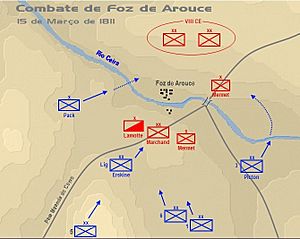Battle of Foz de Arouce facts for kids
Quick facts for kids Battle of Foz de Arouce |
|||||||
|---|---|---|---|---|---|---|---|
| Part of the Peninsular War | |||||||
 The positions and movements during the Combat of Foz de Arouce |
|||||||
|
|||||||
| Belligerents | |||||||
| Commanders and leaders | |||||||
| Strength | |||||||
| 8,000 12 cannons |
7,000 | ||||||
| Casualties and losses | |||||||
| 71 killed and wounded | 250 killed, wounded and captured | ||||||
The Battle of Foz de Arouce was a fight during the Peninsular War. It happened on March 15, 1811, in a place called Foz de Arouce in Portugal. This battle was between the Anglo-Portuguese forces and French troops. The British and Portuguese soldiers were led by Arthur Wellesley, who later became the Duke of Wellington. The French troops were commanded by Marshal Michel Ney.
Why Did the Battle Happen?
This battle was part of a bigger event. The French army, led by General Andre Masséna, was leaving Portugal in the spring of 1811. They were retreating, which means they were moving back. The battle at Foz de Arouce happened during this retreat.
How the Battle Unfolded
The French soldiers had not chosen good places to defend themselves. So, the British and Portuguese leader, Wellington, decided to attack right away. The attack was a surprise, which helped them succeed quickly.
Some soldiers from the 95th Rifles (a special unit) followed a small road. They reached the center of Foz de Arouce, very close to a bridge. They met almost no resistance at first. Other units of the Light Division fought the French head-on. The 3rd Division moved towards the French left side.
Even with weak resistance, the 95th Rifles soon met some French soldiers. The fighting near the bridge made the French realize they might be trapped. Many French units left their fighting positions and rushed towards the river. They tried to cross the bridge.
However, French cavalry (soldiers on horseback) had already crossed the river earlier. These cavalry soldiers blocked the way for the fleeing French infantry. Because they couldn't cross the bridge, some French soldiers tried to cross the river at a shallow spot. The river was flowing fast, and many drowned. The flag (called a regimental eagle) of the 39th French Regiment was lost, and its commander was captured.
Marshal Ney, the French commander, saved the situation. He sent a battalion of the 69th Regiment to counterattack the 95th Rifles. This forced the 95th Rifles to pull back. This action cleared the bridge. The French troops then crossed the bridge, but in some disorder.
While they were crossing, they were hit by artillery fire from the British and Portuguese. They were also hit by fire from their own side, the VIII CE, who couldn't tell friends from enemies in the confusion. As night fell, the French finished crossing. Then, they blew up the bridge to stop the British and Portuguese from following.
What Happened Next?
The French army had between 200 and 400 soldiers killed, wounded, or captured. Historians estimate around 250 French casualties. The British and Portuguese forces had 71 casualties in total. This included 9 dead and 62 wounded. Only two of these casualties were Portuguese soldiers.
The battle was a victory for the Anglo-Portuguese forces.
See also
 In Spanish: Combate de Foz de Arouce para niños
In Spanish: Combate de Foz de Arouce para niños


